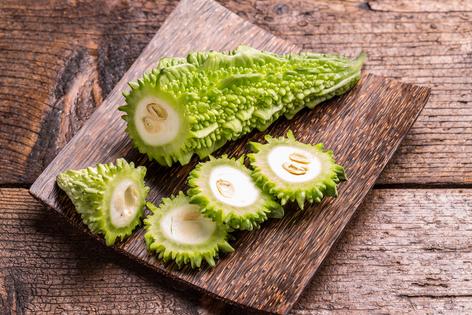Environmental Nutrition: Foods that help diabetes
When you have type 2 diabetes, what you eat matters. Too much carbohydrate can make your blood sugar spike, and too little can provoke a potentially coma-inducing drop. But might there be individual foods you can add to your diet that could help control those spikes and dips? EN separates the science from the hype about specific foods that may help control blood sugar.
Bitter melon
This green, warty tropical gourd -- widely used in traditional medicine as a treatment for diabetes -- is the most bitter of all fruits and vegetables. Bitter melon contains several active substances that may help with blood sugar control, including polypeptide-p, an insulin-like plant compound. A 2011 study showed that 2,000 milligrams (mg) a day of bitter melon significantly reduced blood sugar levels among patients with type 2 diabetes (although not as much as medication). Other research has shown promise for bitter melon and bitter melon extracts, but many of the studies on humans were small or poorly designed. While we wait for conclusive evidence, there's certainly no harm in trying this nutritious vegetable, which is best sliced and cooked in stir-fries, in meals more often. You might be able to get a taste of this delicacy at a Chinese restaurant or in the produce section of an Asian market.
Prickly pear cactus
Used in traditional medicine to treat diabetes, the prickly pear cactus (or nopal) is a popular part of the Mexican diet, frequently diced into dishes, such as salsa, pinto beans, and quesadillas. In 2014, a very small Mexican study showed that participants with diabetes who ate 300 grams (g) of nopal with a high carbohydrate breakfast had less of a blood sugar increase than those who ate the same meal with no cactus. The high fiber content of nopal might be responsible for this effect, but a fiber-free extract was able to control diabetes in rats, so that points to something at play in addition to fiber. While we await better human trials, it's fine to try prickly pear cactus. High in fiber, antioxidants and carotenoids, it is a nutritious addition to any diet.
Vinegar
A promising 2004 study found that drinking 20 g of apple cider vinegar in 40 g of water with 1 teaspoon saccharine helped improved insulin sensitivity in the hour after a high carb meal; but the study was extremely small and the results are far from conclusive. Scientists aren't sure why it might work, but they suspect the acetic acid in vinegar might slow the process of emptying food from the stomach or alter glucose production in the liver. However, current research finds the blood-sugar control effect appears to be strongest in people who do not have diabetes or prediabetes. Try to use vinegar in moderation as a healthful, low-fat flavorful ingredient in cooking, marinades, and salad dressings.
Cinnamon
In 2013, researchers reviewed the available data on cinnamon's effect on blood sugar control and concluded that it was associated with a decrease in levels of fasting blood sugar, and it improved cardiovascular risk factors. That's exciting stuff, but unfortunately other studies disagree with those findings. Studies mostly looked at 1/2 to 1 teaspoon (2 to 4 g) of cassia cinnamon a day, however high levels of cassia cinnamon supplements may pose a risk for liver problems. Ceylon cinnamon is less common, less studied and more expensive, but safer. Keep in mind that supplements are unregulated and may contain potentially liver-damaging coumarin. So feel free to enjoy delicious cinnamon as a regular part of a healthy diet, but approach supplements with caution and don't overdo it.
Okra
Extract of okra lowered blood glucose in obese mice in a 2014 study, but that doesn't merit the social media claims that okra can make diabetes "go away." A more substantial reason that okra may indeed help with blood sugar control is the fact that this vegetable is high in soluble fiber. Besides being responsible for the okra's somewhat slimy consistency, soluble fiber slows the release of sugar into the bloodstream, evening out blood sugar peaks. Okra also contains polyphenols, which seem to provide blood-sugar control benefits. While we're waiting for more research on okra's potential glucose-lowering potential, feel free to enjoy this nutritious vegetable in dishes like gumbo or soups as part of your recipe repertoire.
The foods profiled here might help with blood sugar control, and you should tell your doctor if you plan to eat a lot of them regularly. Remember, healthy food choices, medication and regular exercise are the key to diabetes control, and no superfood can take their place.
(Environmental Nutrition is the award-winning independent newsletter written by nutrition experts dedicated to providing readers up-to-date, accurate information about health and nutrition in clear, concise English. For more information, visit www.environmentalnutrition.com.)







